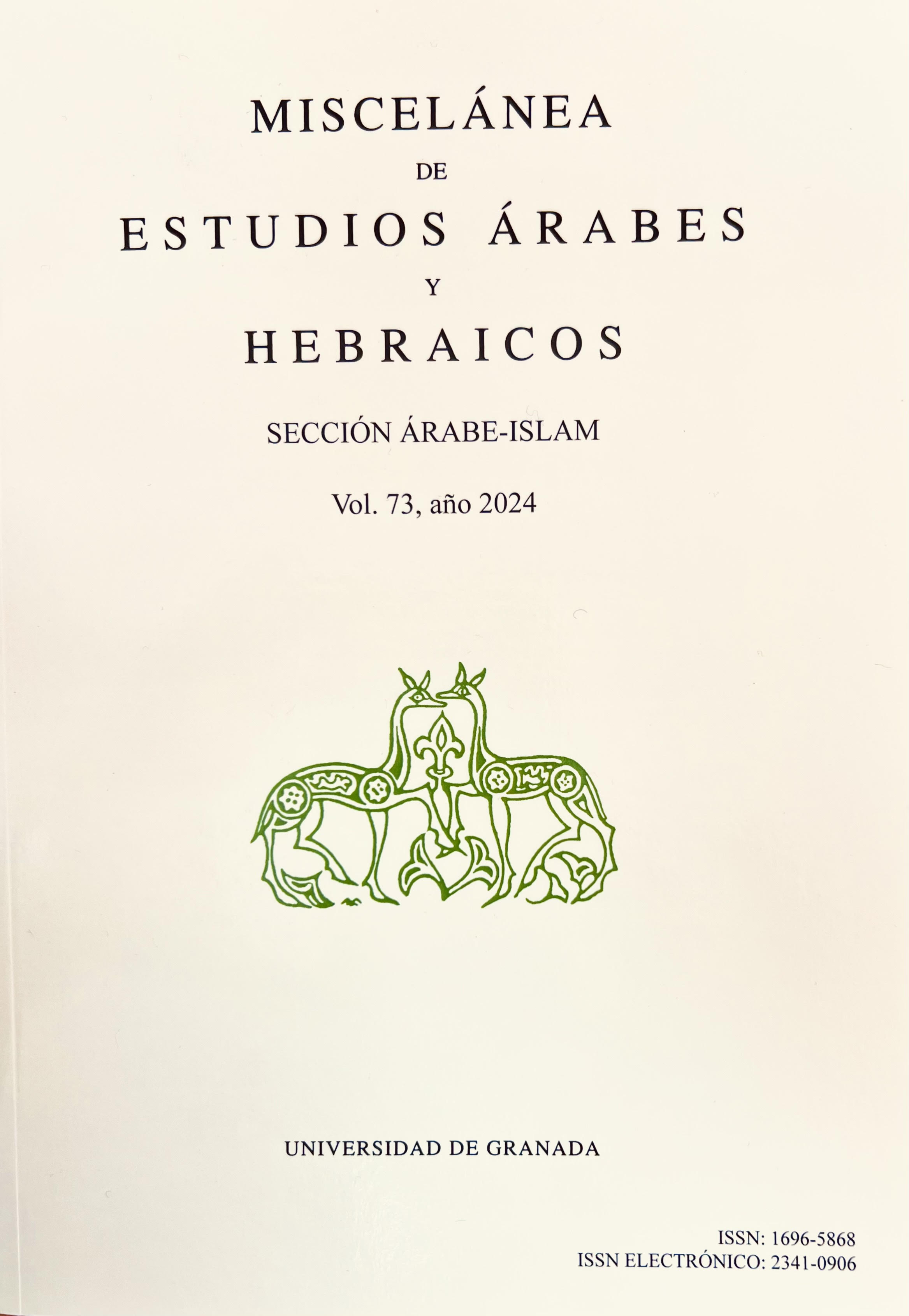Messianic Nationalism in Iran: the Case of President Maḥmoud Aḥmadineĵād and the Figure of Mahdi
DOI:
https://doi.org/10.30827/meaharabe.v73.28310Keywords:
Maḥmoud Aḥmadineĵād. Messianic nationalism. Mahdi. ḤojjatiyehAbstract
Former President of the Islamic Republic of Iran (2005-2013) Maḥmoud Aḥmadineĵād was known for his extremist rhetoric and outlandish style. During his tenure, he not only proclaimed the immediate coming of the Mahdi, but considered that he considered Iran as a privileged nation above the rest. In this paper wewill analyze the declarations of president Ahmadinejad from the point of view of messianic nationalism and the history of messianism in Iran. We will also study the political tensions of the moment, as well as the impact of the belief in the Mahdi for Shiite Muslims. Given Aḥmadineĵād's possible belonging to the Ḥoŷŷatiyē society, we will analyze its characteristics and the role that it may have played in the president's mentality. Despite the impact of his speeches, which provoked a negative reaction from the Shiite clergy, he failed to provoke a rethinking of national identity or undermine the power of the clergy in the country.Downloads
References
ABBATE, Stefano. “Nacionalismo y mesianismo”. Revista de Estudios Políticos, 188, (2020), pp. 71-95. https://doi.org/10.18042/cepc/rep.188.03
AHDIYYIH, Mohebat. “Ahmadinejad and the Mahdi”. Middle East Quarterly, 15, 4, (2008), pp. 27-36. https://www.meforum.org/1985/ahmadinejad-and- the-mahdi [consultado 15/08/2020]
AMANAT, Abbas. “Islam in Iran V. Messianic islam in Iran”. Encyclopædia Iranica Online edition, 2012. http://www.iranicaonline.org/articles/islam-in- iran-v-messianic-islam-in-iran [consultado 24/08/2023]
AMIR-MOEZZI, Mohammad Ali. “Islam in Iran VII. The Concept of Mahdi in Twelver Shi’ism”. Encyclopaedia Iranica Online edition, 2012. http://www.iranicaonline.org/articles/islam-in-iran-vii-the-concept-of-mahdi- in-twelver-shiism [consultado el 24/08/2023]
ANDERSON, Benedict. Comunidades imaginadas. Reflexiones sobre el origen y difusión del nacionalismo. Trad. Eduardo L. Suárez. Méjico D.F: Fondo de Cultura Económica, 1993
ARJOMAND, Saïd Amir. “Constitutional Implications of Current Political Deba- tes in Iran”. En Ali Gheissari. (Ed.), Contemporary Iran. Economy, Society, Politics. Oxford: Oxford University Press, 2009, pp. 248-249.
BALIBAR, Etienne. ““God Will not Remain Silent”. Zionism, Messianism and Nationalism.” Human Architecture: Journal of the Sociology of Self- Knowledge. VII, 2, (2009), pp. 123-134. https://search.proquest.com/docview/ 210139171?rfr_id=info%3Axri%2Fsid%3Aprimo [consultado 28/08/2023]
COOK, David. “Messianism in the Shiite Crescent”. Current Trends in Islamic Idelogy, 11 (2011), pp. 91-103. https://www.hudson.org/research/7906- messianism-in-the-shiite-crescent [consultado 28/08/2023]
CRONE, Patricia. & COOK, Michael. Hagarism. The Making of the Islamic World. Cambridge. New York & Others: Cambridge University Press, 1977.
FILIU, Jean-Pierre. “The Return of Political Mahdism”. Current Trends in Islam- ist Ideology, 8 (2009), pp. 26-38. ⟨hal-03459983⟩
GEIHSSARI, Ali. & SANANDAJI, Kaveh-Cyrus. “New Conservative Politics and Electoral Behavior”. En Ali GHEISSARI (Ed.). Contemporary Iran. Economy, Society, Politics. Oxford: Oxford University Press, 2009, https://doi.org/10.1093/acprof:oso/9780195378481.003.0009
GUITOO, Arash. Ahmadinezhād’s Mahdi. The ideological aspects of Ahmadi- nezhād’s political fail., 2021. https://www.islam.uni- kiel.de/de/mitarbeiter/arash-guitoo-m.a/bachelor-thesis-abstract [consultado 20/05/2021]
HASTINGS, Adrian. La construcción de las nacionalidades. Etnicidad, religión y nacionalismo. Trad. Cristina Piña. Cambridge: Cambridge University Press, 2000.
HOBSBAWM, Eric & RANGER, Terence. La invención de la tradición. Trad. Omar Rodríguez. Barcelona: Críticam 2002.
HOYO PROHUBER, Henio. “Cuando las ideas se vuelven creencias útiles: El nacionalismo como instrumento político”. Foro Internacional 196, XLIX, 2, (2009), pp. 370-402.
KAUSSIER, Bernd. “Is the End Night for the Islamic Republic?” Current Trends in Islamist Ideology, 13, (2012), pp. 69-90. https://www.hudson.org/research/ 9809-is-the-end-nigh-for-the-islamic-republic- [consultado 03/02/2020]
KEDOURIE, Elie. Nacionalismo. Trad. Juan José Solazabal Echebarría. Madrid: Centro de Estudios Constitucionales., 1985.
MAGHEN, Ze’ev. “Occultation in Perpetuum: Shi’ite Messianism ant the Poli- cies of the Islamic Republic”. Middle East Journal, 62, 2, (2008), 232-257. https://doi.org/10.3751/62.2.13
MARTÍNEZ RABADÁN, Guillermo. “La perspectiva de los medios iraníes sobre la identidad nacional planteada por Mahmud Ahmadineyad.” Hesperia. Cultu- ras del Mediterráneo, 26, (2023), 97-111.
NAJI, Kasra. The Secret History of Iranian’s Radical Leader. Londres/Nueva York: I. B. Tauris, 2008.
PISCATORI, James. Islam in a World of Nation States. Cambridge: University Press. The Royal Institute of International Affairs, 1986
Poštpardē-ye sojanān-e `aŷib-e Aḥmadineĵād. (1394, tir 4/ 2015, junio 25). https://fararu.com/fa/news/237943/پشت%E2%80%8Cپرده-سخنان-عجيب- احمدی%E2%80%8Cنژاد [consultado 01/07/2023]
SADRI, Mahmoud. “Hojjatiya”, Encyclopaedia Iranica. Online edition., 2012. Recuperado de http://www.iranicaonline.org/articles/hojjatiya [consultado 27/08/2023]
SARZA`IM, ‘Ali. Pōpōlism-e Irāni: Taḥlil-e keyfiyat-e ḥakamrāni-ye Maḥmud Aḥmadineĵād az manẓar-e eqteṣādi va ertebāṭāt-e siyāsi. Tehrān: Našr-e Kar- gadān. 1396/2017.
SEYŶĀNI, ‘Ali Aṣğar. Mostanad-e Ẓohur besiyār nazdik ast. [Vídeo], (2011, mayo 4). https://www.youtube.com/watch?v=PEVBTvHgkqU&list=PLjq EXKch6Y2opB5FD6au3z1aVAYH5O5Cf&index=1 [consultado 27/08/2023]
SMITH, Anthony D. The Ethnic Origins of Nations. Oxford/Cambridge: Bla- ckwell, 1986.
—. La identidad nacional. Trad. Adela Despujol Ruiz-Jiménez. Madrid: Trama Editorial S. M., 1991.
SMITH, Anthony D. Chosen Peoples. Sacred Sources of National Identity. New York: Oxford University Press, 2003.
Downloads
Published
How to Cite
Issue
Section
License
Copyright (c) 2024 Guillermo Martínez Rabadán

This work is licensed under a Creative Commons Attribution 4.0 International License.
The authors publishing their work in this journal agree to the following terms and conditions:
1. The authors retain the copyright and give the journal the right to be the first publication of the work and also to be licensee under a Creative Commons Attribution License which allows others to share the work, provided the author of the work and the initial publication in this journal are acknowledged.
2. Authors may make additional agreements separately for the non-exclusive distribution of the version of the work published in the journal (for example, putting it in an institutional repository or publishing it in a book), with acknowledgement of its initial publication in this journal.
3. Authors are allowed and encouraged to electronically disseminate (for example, in institutional repositories or on their own web page) the published version of their works (publisher's post-print version) or, if not possible, the author's reviewed and accepted post-print version. This is to facilitate productive exchanges, and allow for earlier and greater citation by third parties of the published works (See The Effect of Open Access).
4. The journal accepts no responsibility for the opinions expressed by the authors.















